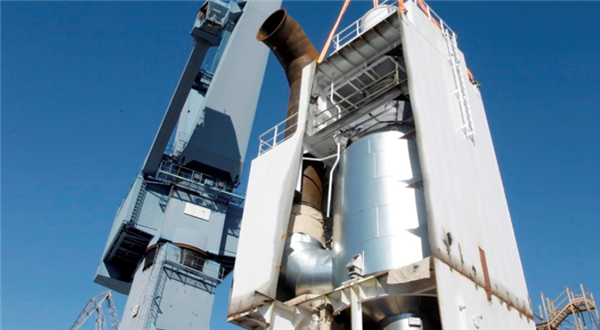Economou eyes scrubber programmes completing in full
While the year started off promisingly for owners that had bet on scrubbers, with a wide spread between the more expensive very low sulphur fuel oil and high-sulphur fuel oil, surpassing $300 per tonne in January, that narrowed sharply as oil prices slumped last month
SCRUBBER investment programmes launched before the fall in oil prices are likely to be completed regardless of the less lucrative price spread between very low-sulphur fuel oil and traditional heavy fuel oil, according to the shipowner George Economou.
Mr Economou’s installation programme for his TMS-managed dry bulk and tanker fleets is one of the industry’s largest, alongside other major investors in exhaust gas cleaning systems such as Oldendorff Carriers and Star Bulk Carriers.
He said he expected the vast majority of programmes to be completed because of front-loaded payments for the systems.
The view contrasts with that of some analysts who have assessed the reduced premium for scrubber-fitted vessels as motive enough for many owners to cancel retrofitting plans.
“It is a one-way street once you order the equipment,” Mr Economou told Lloyd’s List. “You pay 80% of the equipment, which is half the total cost.”
He did, however, see some owners trying to delay in difficult market conditions.
While the year started off promisingly for owners that had bet on scrubbers, with a wide spread between the more expensive very low sulphur fuel oil and high-sulphur fuel oil, surpassing $300 per tonne in January, that narrowed sharply as oil prices slumped last month.
Based on a spread of $150 per tonne, which had been seen as conservative prior to Saudi Arabia’s production increase, the investment payback period for most ships was two to three years.
Last week, the spread hovered around $70 per tonne in Rotterdam.
“I think the spread will come up again,” said Mr Economou. “Payback will increase from what it was — if the spread is half then the payback period will be double.
“Whether it proves worthwhile or not, time will tell,” he said. “We planned all the works two years ago and you have to judge decisions at the time you make them.”
Although the shipowner has criticised the International Maritime Organization for “the wrong decision” to allow scrubbers as an alternative to burning VLSFO, he took the decision to install scrubbers on every vessel of under 15 years of age in the TMS-managed fleet, irrespective of size.
Unlike most major companies that have opted for scrubbers, the TMS fleet is focused squarely on the spot market and charterers have not been involved in the funding.
So far 60, vessels have been fitted with scrubbers, leaving another 41 to go.
Of the vessels that have not yet been scrubber-fitted, 18 are bulkers. “On the dry bulk side, we plan to do 53 ships and we have already done 35,” he said.
The group estimates it will complete installations for the bulkers by August this year at latest.
Installations on tankers were intentionally slowed because of strong recent conditions for tanker chartering. So far, 25 tankers have been scrubber-fitted out of a scheduled total of 48.
“We stopped because the market was good and we will resume when the market is softer,” Mr Economou said.




